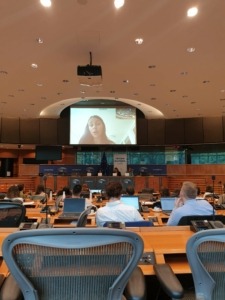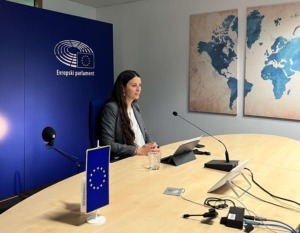On Wednesday, 5 October 2022, MEP Irena Joveva attended a meeting between the European Parliament delegation and the North Macedonian Parliament (the Sobranie) and spoke about the state of the media and civil society in North Macedonia. First, she expressed her satisfaction at the unblocking of the accession negotiations and then, among other things, congratulated Macedonian civil society for acting as a guardian of society, protecting human rights and fighting for a better and fairer country.
 During the two-day exchange of views between the two Parliaments, MEP Joveva, as Co-Chair, started her address in Macedonian and then focused on the state of the media and civil society in North Macedonia, which she follows closely. She praised the improvement in terms of media freedom in the country, which has progressed to a better level compared to other countries in the Western Balkans region. She added that the country still had some way to go in the area of fighting disinformation and ensuring transparency of state institutions.
During the two-day exchange of views between the two Parliaments, MEP Joveva, as Co-Chair, started her address in Macedonian and then focused on the state of the media and civil society in North Macedonia, which she follows closely. She praised the improvement in terms of media freedom in the country, which has progressed to a better level compared to other countries in the Western Balkans region. She added that the country still had some way to go in the area of fighting disinformation and ensuring transparency of state institutions.
Joveva also touched on the European Media Freedom Act. She said that the act was necessary to protect media freedom in the European Union, as political interference and government control should have no place in journalism. She stressed that media freedom is of the utmost importance for a functioning democracy.
To continue, Joveva welcomed that the accession negotiations were finally opened after they had been blocked for a long time by some EU Member States. In her speech, she also mentioned young people, who suffer the most from environmental, political and economic impacts. Other topics discussed by the participants included the energy crisis, the environment, the rule of law, good neighbourly relations, and cooperation in the region.
Referring to civil society organisations, she said: ‘They must be involved and consulted at all stages of decision-making, especially at local level in the policy-making phases.’
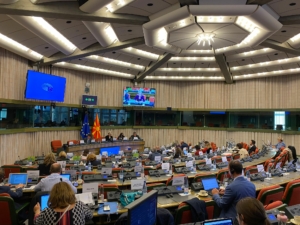 In conclusion, Joveva expressed her wish that the strategy for cooperation with North Macedonian civil society be implemented in a timely and transparent manner. She concluded her speech with the thought that the North Macedonian leaders should continue on the path of improvement strengthening an independent media, protecting journalists as well as the environment.
In conclusion, Joveva expressed her wish that the strategy for cooperation with North Macedonian civil society be implemented in a timely and transparent manner. She concluded her speech with the thought that the North Macedonian leaders should continue on the path of improvement strengthening an independent media, protecting journalists as well as the environment.
The delegation to the EU-North Macedonia Joint Parliamentary Committee (JPC), vice-chaired by MEP Joveva, met with members of the European Parliament and the Sobranie in the presence of representatives of the European Commission. The delegation meets in person twice a year to discuss the work of the two parliaments, their cooperation, joint activities and the approximation of North Macedonia to the European Union. The two-day exchange of views was followed by a vote on recommendations.

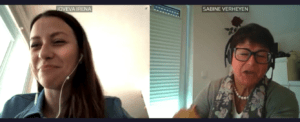
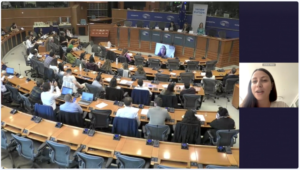 Joveva maintained that as long as mental health is stigmatised to such an extent, young people will not dare to seek help, which will inevitably lead to an even greater increase in mental distress. She believes that overcoming stigma requires education and providing people with the right information. This should start with mainstreaming mental health into school systems, while a frank conversation about mental health must continue with all members of our society (peers, parents, doctors, teachers, influencers, etc.).
Joveva maintained that as long as mental health is stigmatised to such an extent, young people will not dare to seek help, which will inevitably lead to an even greater increase in mental distress. She believes that overcoming stigma requires education and providing people with the right information. This should start with mainstreaming mental health into school systems, while a frank conversation about mental health must continue with all members of our society (peers, parents, doctors, teachers, influencers, etc.).